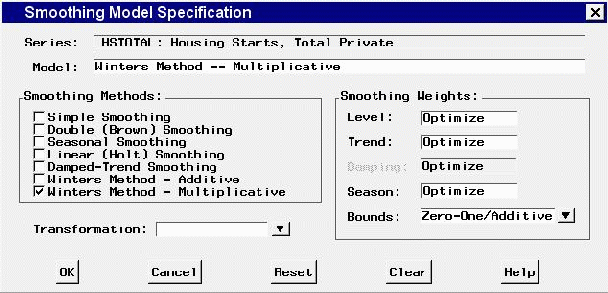Smoothing Model Specification Window
Use the Smoothing Model Specification window to specify and fit exponential smoothing and Winters method models. Access it from the Develop Models window by using the Fit Model submenu of the Edit menu or from the pop-up menu when you click an empty area of the model table.

Controls and Fields
- Series
is the name and variable label of the current series.- Model
is a descriptive label for the model that you specify. You can type a label in this field or allow the system to provide a label. If you leave the label blank, a label is generated automatically based on the options you specify.- Smoothing Methods
-
- Simple Smoothing
specifies simple (single) exponential smoothing.- Double (Brown) Smoothing
specifies double exponential smoothing by using Brown’s one parameter model (single exponential smoothing applied twice).- Seasonal Smoothing
specifies seasonal exponential smoothing. (This is like Winters method with the trend term omitted.)- Linear (Holt) Smoothing
specifies exponential smoothing of both the series level and trend (Holt’s two parameter model).- Damped-Trend Smoothing
specifies exponential smoothing of both the series level and trend with a trend damping weight.- Winters Method - Additive
specifies Winters method with additive seasonal factors.- Winters Method - Multiplicative
specifies Winters method with multiplicative seasonal factors.
- Smoothing Weights
-
displays the values used for the smoothing weights. By default, the Smoothing Weights fields are set to "optimize," which means that the system will compute the weight values that best fit the data. You can also type smoothing weight values in these fields.- Level
is the smoothing weight used for the level of the series.- Trend
is the smoothing weight used for the trend of the series.- Damping
is the smoothing weight used by the damped-trend method to damp the forecasted trend towards zero as the forecast horizon increases.- Season
is the smoothing weight used for the seasonal factors in Winters method and seasonal exponential smoothing.
- Transformation
displays the series transformation specified for the model. When a transformation is specified, the model is fit to the transformed series, and forecasts are produced by applying the inverse transformation to the model predictions. Select Log, Logistic, Square Root, Box-Cox, or None from the pop-up list.- Bounds
-
displays the constraints imposed on the fitted smoothing weights. Select one of the following from the pop-up list:- Zero-One/Additive
sets the smoothing weight optimization region to the intersection of the region bounded by the intervals from zero (0.001) to one (0.999) and the additive invertible region. This is the default.- Zero-One Boundaries
sets the smoothing weight optimization region to the region bounded by the intervals from zero (0.001) to one (0.999).- Additive Invertible
sets the smoothing weight optimization region to the additive invertible region.- Unrestricted
sets the smoothing weight optimization region to be unbounded.- Custom
opens the Smoothing Weights window to enable you to customize the constraints for smoothing weights optimization.
- OK
closes the Smoothing Model Specification window and fits the model you specified.- Cancel
closes the Smoothing Model Specification window without fitting the model. Any options you specified are lost.- Reset
resets all options to their initial values upon entry to the window. This might be useful when editing an existing model specification; otherwise, Reset has the same function as Clear.- Clear
resets all options to their default values.